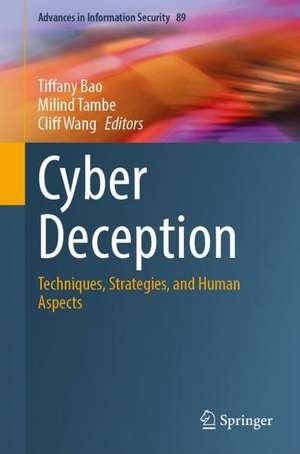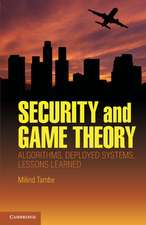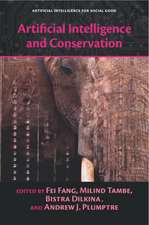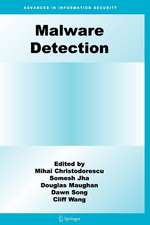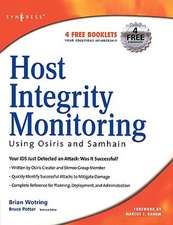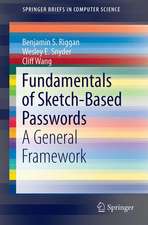Cyber Deception: Techniques, Strategies, and Human Aspects: Advances in Information Security, cartea 89
Editat de Tiffany Bao, Milind Tambe, Cliff Wangen Limba Engleză Hardback – 9 mar 2023
This book introduces recent research results for cyber deception, a promising field for proactive cyber defense. The beauty and challenge of cyber deception is that it is an interdisciplinary research field requiring study from techniques and strategies to human aspects.
This book covers a wide variety of cyber deception research, including game theory, artificial intelligence, cognitive science, and deception-related technology. Specifically, this book addresses three core elements regarding cyber deception:
- Understanding human’s cognitive behaviors in decoyed network scenarios
- Developing effective deceptive strategies based on human’s behaviors
- Designing deceptive techniques that supports the enforcement of deceptive strategies
The research introduced in this book identifies the scientific challenges, highlights the complexity and inspires the future research of cyber deception.
Researchers working in cybersecurity and advanced-level computer science students focused on cybersecurity will find this book useful as a reference. This book also targets professionals working in cybersecurity.
Chapter 'Using Amnesia to Detect Credential Database Breaches' and Chapter 'Deceiving ML-Based Friend-or-Foe Identification for Executables' are available open access under a Creative Commons Attribution 4.0 International License via link.springer.com.
| Toate formatele și edițiile | Preț | Express |
|---|---|---|
| Paperback (1) | 873.29 lei 38-44 zile | |
| Springer International Publishing – 9 mar 2024 | 873.29 lei 38-44 zile | |
| Hardback (1) | 991.46 lei 6-8 săpt. | |
| Springer International Publishing – 9 mar 2023 | 991.46 lei 6-8 săpt. |
Din seria Advances in Information Security
- 20%
 Preț: 997.94 lei
Preț: 997.94 lei - 20%
 Preț: 647.28 lei
Preț: 647.28 lei - 20%
 Preț: 901.80 lei
Preț: 901.80 lei - 20%
 Preț: 1165.69 lei
Preț: 1165.69 lei - 20%
 Preț: 866.25 lei
Preț: 866.25 lei - 20%
 Preț: 935.17 lei
Preț: 935.17 lei - 20%
 Preț: 638.69 lei
Preț: 638.69 lei - 15%
 Preț: 637.28 lei
Preț: 637.28 lei - 20%
 Preț: 647.79 lei
Preț: 647.79 lei - 20%
 Preț: 1152.15 lei
Preț: 1152.15 lei - 18%
 Preț: 1004.81 lei
Preț: 1004.81 lei - 20%
 Preț: 545.13 lei
Preț: 545.13 lei - 20%
 Preț: 1050.67 lei
Preț: 1050.67 lei - 18%
 Preț: 1674.82 lei
Preț: 1674.82 lei - 20%
 Preț: 933.57 lei
Preț: 933.57 lei - 20%
 Preț: 1171.94 lei
Preț: 1171.94 lei - 20%
 Preț: 931.50 lei
Preț: 931.50 lei - 18%
 Preț: 949.10 lei
Preț: 949.10 lei - 20%
 Preț: 995.75 lei
Preț: 995.75 lei - 20%
 Preț: 644.66 lei
Preț: 644.66 lei - 20%
 Preț: 643.30 lei
Preț: 643.30 lei - 15%
 Preț: 641.20 lei
Preț: 641.20 lei - 20%
 Preț: 647.61 lei
Preț: 647.61 lei - 20%
 Preț: 648.11 lei
Preț: 648.11 lei - 20%
 Preț: 652.54 lei
Preț: 652.54 lei - 20%
 Preț: 642.98 lei
Preț: 642.98 lei - 20%
 Preț: 640.35 lei
Preț: 640.35 lei - 15%
 Preț: 639.59 lei
Preț: 639.59 lei - 15%
 Preț: 637.46 lei
Preț: 637.46 lei - 20%
 Preț: 820.50 lei
Preț: 820.50 lei - 18%
 Preț: 1219.01 lei
Preț: 1219.01 lei - 15%
 Preț: 634.18 lei
Preț: 634.18 lei
Preț: 991.46 lei
Preț vechi: 1239.33 lei
-20% Nou
Puncte Express: 1487
Preț estimativ în valută:
189.71€ • 198.61$ • 156.98£
189.71€ • 198.61$ • 156.98£
Carte tipărită la comandă
Livrare economică 05-19 aprilie
Preluare comenzi: 021 569.72.76
Specificații
ISBN-13: 9783031166129
ISBN-10: 3031166124
Pagini: 249
Ilustrații: X, 249 p. 62 illus., 51 illus. in color.
Dimensiuni: 155 x 235 mm
Greutate: 0.54 kg
Ediția:2023
Editura: Springer International Publishing
Colecția Springer
Seria Advances in Information Security
Locul publicării:Cham, Switzerland
ISBN-10: 3031166124
Pagini: 249
Ilustrații: X, 249 p. 62 illus., 51 illus. in color.
Dimensiuni: 155 x 235 mm
Greutate: 0.54 kg
Ediția:2023
Editura: Springer International Publishing
Colecția Springer
Seria Advances in Information Security
Locul publicării:Cham, Switzerland
Cuprins
1. Diversifying Deception: Game Theoretic Models for Two-Sided and Layered Deception.- 2. Human-Subject Experiments on Risk-based Cyber Camouflage Games.- 3. Adaptive Cyberdefense with Deception: A Human-AI Cognitive Approach.- 4. Cognitive Modeling for Personalized, Adaptive Signaling for Cyber Deception.- 5. Deceptive Signaling: Understanding Human Behavior against Signaling algorithms.- 6. Optimizing Honey Traffic Using Game Theory and Adversarial Learning.- 7. Mee: Adaptive Honeyfile System for Insider Attacker Detection.- 8. HoneyPLC: A Next-Generation Honeypot for Industrial Control Systems.- 9. Using Amnesia to Detect Credential Database Breaches.- 10. Deceiving ML-Based Friend-or-Foe Identification for Executables.
Notă biografică
Tiffany Bao:
Dr. Tiffany Bao is an Assistant Professor at Arizona State University. Her research interest is aspects of software security, which spans binary analysis techniques, game-theoretical vulnerability mitigation strategies, qualitative study on cybersecurity operations, and vulnerability risk assessment. Dr. Bao was the winner of the NSA’s Annual Best Scientific Cybersecurity Paper Award and IEEE Security and Privacy’s Best Student Paper Award. She has served as a program committee member in toptier cybersecurity conferences, including IEEE Security and Privacy, USENIX Security, Computer and Communication Security, and Network & Distributed System Security Symposium. Her team has discovered and responsibly reported tens of zero-day vulnerabilities to the community. She received her Ph.D. from Carnegie Mellon University.
Milind Tambe:
Dr. Milind Tambe is Gordon McKay Professor of Computer Scienceand Director of Center for Research in Computation and Society at Harvard University; concurrently, he is also Principal Scientist and Director "AI for Social Good" at Google Research. He is recipient ofMilind Tambe photo 2 the IJCAI (International Joint Conference on AI) John McCarthy Award, AAMAS ACM (Association for Computing Machinery) Autonomous Agents Research Award, AAAI (Association for Advancement of Artificial Intelligence) Robert S. Engelmore Memorial Lecture Award, and he is a fellow of AAAI and ACM. He is also a recipient of the INFORMS Wagner prize for excellence in Operations Research practice and Rist Prize from MORS (Military Operations Research Society). For his work on AI and public safety, he has received Columbus Fellowship Foundation Homeland security award and commendations and certificates of appreciation from the US Coast Guard, the Federal Air Marshals Service and airport police at the city of Los Angeles.
Cliff Wang:
Dr. Cliff Wang graduated from North Carolina State University with a PhD in computer engineering in 1996. He has been carrying out research in the area of computer vision, medical imaging, high speed networks, and most recently information security. He has authored 60 technical papers and 3 Internet standards RFCs. Dr. Wang also authored/edited for 20 books in the area of information security and hold 4 US patents on information security system development.
Since 2003, Dr. Wang has been managing extramural research portfolio on information assurance at US Army Research Office. In 2007 he was selected as the director of the computing sciences division at ARO while in the same time managing his program in cyber security. For the past ten years, Dr. Wang managed over $250M research funding which led to significant technology breakthroughs. Dr. Wang also holds adjunct professor appointment at both Department of Computer Science and Department of Electrical and Computer Engineering at North Carolina State University. Dr. Wang is a Fellow of IEEE and AAAS.
Textul de pe ultima copertă
This book introduces recent research results for cyber deception, a promising field for proactive cyber defense. The beauty and challenge of cyber deception is that it is an interdisciplinary research field requiring study from techniques and strategies to human aspects.
This book covers a wide variety of cyber deception research, including game theory, artificial intelligence, cognitive science, and deception-related technology. Specifically, this book addresses three core elements regarding cyber deception:
- Understanding human’s cognitive behaviors in decoyed network scenarios
- Developing effective deceptive strategies based on human’s behaviors
- Designing deceptive techniques that supports the enforcement of deceptive strategies
The research introduced in this book identifies the scientific challenges, highlights the complexity and inspires the future research of cyber deception.
Researchers working in cybersecurity and advanced-level computer science students focused on cybersecurity will find this book useful as a reference. This book also targets professionals working in cybersecurity.
Chapter 'Using Amnesia to Detect Credential Database Breaches' and Chapter 'Deceiving ML-Based Friend-or-Foe Identification for Executables' are available open access under a Creative Commons Attribution 4.0 International License via link.springer.com.
Caracteristici
Presents a comprehensive perspective in cyber deception and state of art in cyber deception research Provides necessary elements related to cyber deception from cybersecurity techniques Offers multi-disciplinary technical content and a succinct summary of the latest research outcome for cyber deception
